Budapest is the new Taiwan — Birth Rate Drop of -22.2%!
Igor ChudovJul 3
Interesting news on the birth rate drop front! It turns out that the most vaccinated counties of Hungary have the worst drop in birth rates in 2022! This is a within-country comparison, comparing Hungarians to Hungarians, for the same time period.
Thanks to my incredible reader “handyman” and Twitter user @overcatbe, I came across two pieces of data:
- Vaccination Rate in Hungary by county as of July 13, 2021 (archive link)
- Change in Birth Rate in Hungary by County for Q1 2022 (archive link)
I took my time to prepare a map of Hungary with vaccination data as of Jul 13, 2021, with birth rate changes overlaid and listed as BLUE (for declines) or RED (for increases).
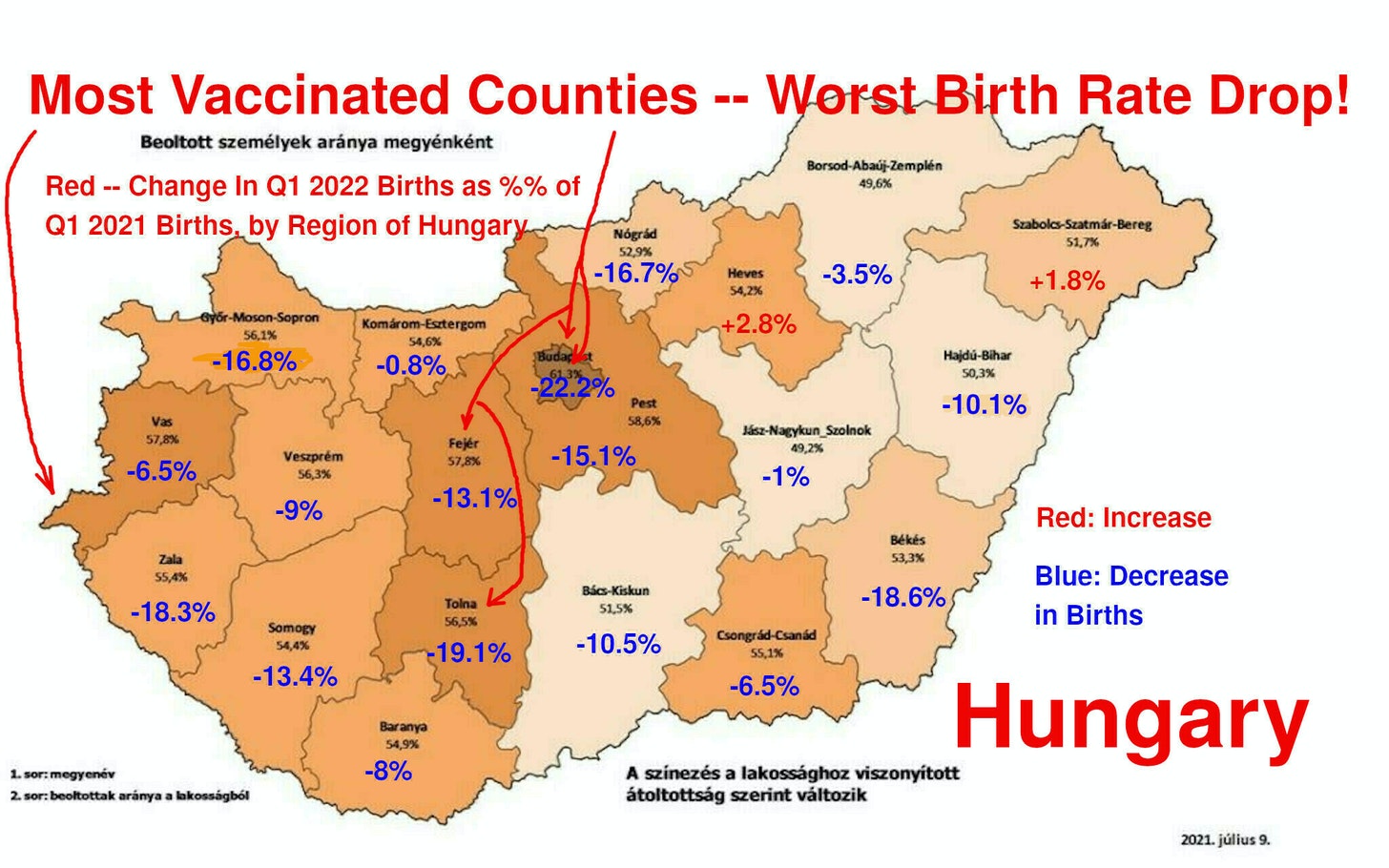
Unfortunately, this data is noisy, as it presents only a single-moment snapshot of vaccination rates, and they are not super dissimilar. To make the comparison less noisy, I decided to pick five MOST vaccinated counties, and five LEAST vaccinated counties. The idea is to compare changes in birth rates among the most divergent counties, eliminating some amount of noise, driven by little-different counties.
Before I go further, I have to remind my readers: birth rates are always seasonal! Most parents prefer to make a “spring baby”, which often ends up with them making a “summer baby” because conception takes more time than expected. So, never compare adjacent quarters as they are guaranteed to have dramatic changes that are simply seasonality-driven, with differences very repeatable over the years. Only compare quarters of one year with same quarters of another year, please.
My own birth rate comparison compares Q1 of 2022, against Q1 of 2021. Since they are within-country comparisons, we can be more confident that they are driven by vaccination rates, as opposed to political, economic, or ethnic differences. These people are all Hungarians.
So, here are the 5 most vaccinated counties, contrasted with the 5 least vaccinated counties.
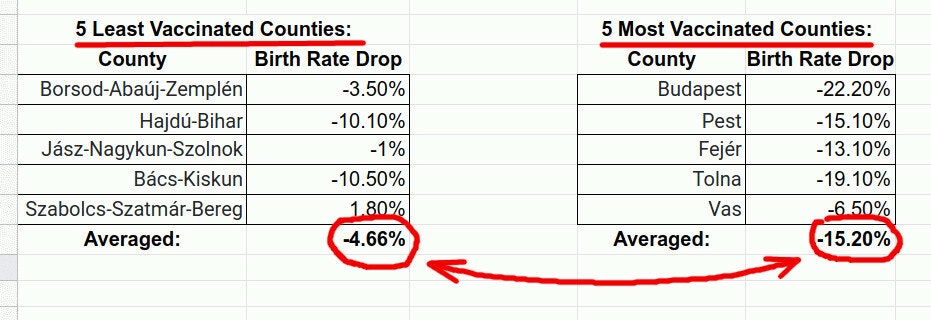
You can see that the five least vaccinated counties experienced only a 4.66% drop in birth rates between Q1 of 2021 and Q1 of 2022. At the same time, five most vaccinated counties experienced a 15.2% drop in birth rates! (NOTE: birth rate decline numbers are averaged without weighing by population. Our astute reader Richard Zucker commented and calculated the decline based on the number of total births for the most-vaccinated group and it is -17.4%, an even more impressive drop)
This is a tremendous 10.5% difference between birth rate outcomes! Put in other words, the birth rate decline in most heavily vaccinated Hungarian counties was THREE TIMES greater than the decline in least-vaccinated counties!
This is an apples-to-apples, Hungarians-to-Hungarians, same time period comparison! Pretty much the only variable is the extent to which those counties vaccinated their citizens by July 2021, including young people likely to make babies. Again, to remind you: the vaccination rates are a snapshot for July 13, 2021. You can add 9 months to July 2021, which gives you April 2022. Thus, you can see why birth rates in Q1 2022 changed: because of Covid vaccination.
The result? The more vaccination, the greater the declines in the birth rates.
Linear Regression
I ran a linear regression of the 20 county data pairs (vaccination rate on Jul 13 2021 vs birth rate drop in 2022). Here’s the result:
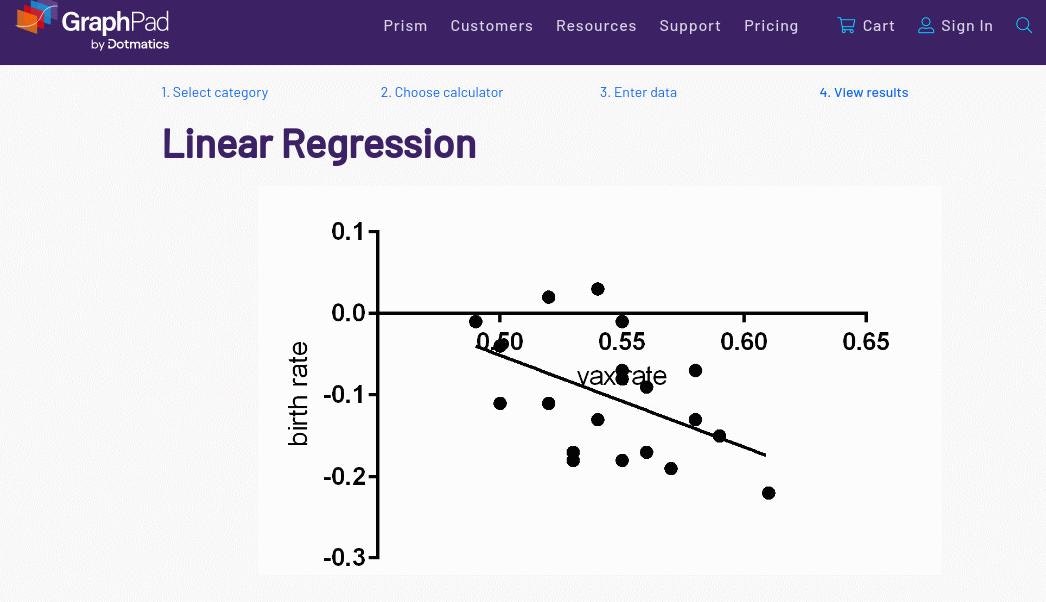
And here are the parameters of the straight line that the regression fitted (the trend line):
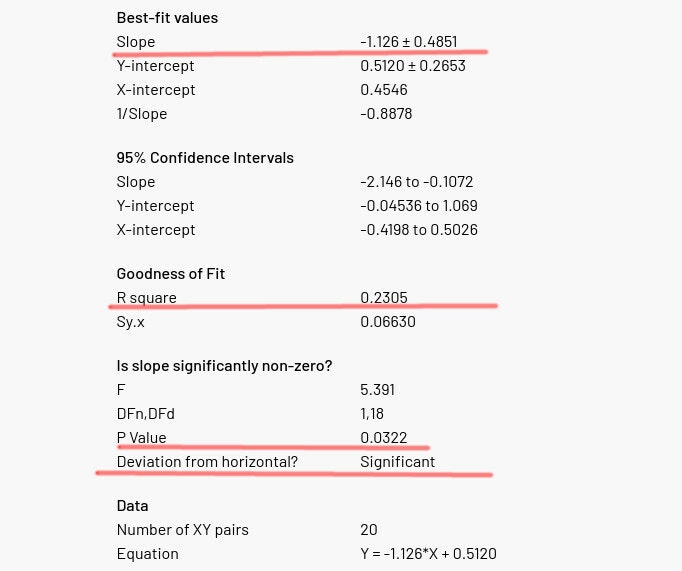
What is important is that statistical analysis shows the slope to be “statistically significantly different from zero”, in other words, the effect of vaccination on birth rate is highly likely NOT a fluke.
Another thing that is notable is that the “R-squared” — the measure of how much variation is explained by vaccination rate — is relatively low at 0.23. This is totally understandable, as we only have entire-population vaccination rates as of one specific date. There is no reason that the snapshot of somewhat unrelated numbers (vaccination rates including octogenarians) as of that date could explain the entire variation. But, sadly, this is the data that we have to work with. And it shows what we need to know.
Q.E.D.
For more interesting news regarding drops in birth rates this year, see my series:
- Sweden (dramatic steady decline to -10% this year)
- Taiwan (-23% decline)
- Germany, North Dakota, UK, and Switzerland. (12-13% declines)
Questions
Here’s a good looking Hungarian parliamentarian asking questions about what happened to her country:
 Igor Chudov 🐭 @ichudov
Igor Chudov 🐭 @ichudovOops, Hungary’s birth rate falls 20% after mandated experimental treatments began 9 months prior in Hungary. If you like smart and sexy cisgender female presenters, watch this video of Hungary Parliament hearing. The dominoes are falling!
rumble.com/v1ampa7-hungar…
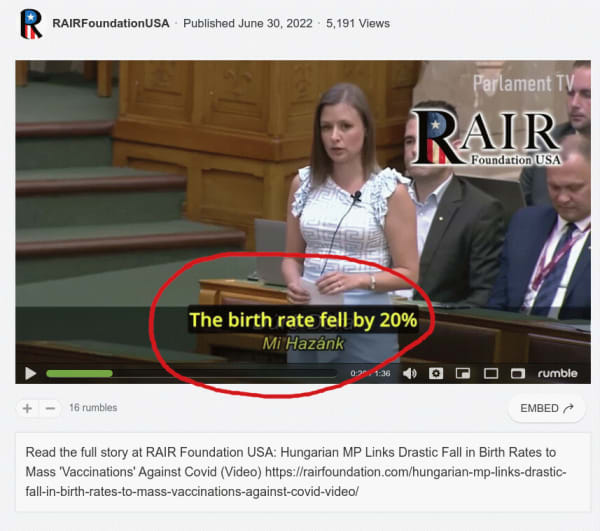
July 2nd 2022
41 Retweets102 Likes
Will Fertility Come Back?
It is becoming fairly apparent that the 2022 fertility drops are the true “black swans” of demographics, unprecedented in the breadth of countries involved, very large, deepening, extremely statistically significant, and very worrying.
A big question of the day is: is this a temporary situation or will the declines be permanent? If they are permanent, it may lead to depopulation of affected countries!
The answer is UNKNOWN to me and is also unknown to anyone else. Beware of vaccine advocates saying “birth rate declines are temporary and no big deal, the vaccine is working as expected”. Beware of vaccine skeptics jumping the gun and proclaiming that we will for sure be depopulated. We genuinely do NOT know, yet. The time has not passed yet, for us to know.
Despite not knowing, we can start worrying right now.
From other articles, we know that
- Disruptions in female periods after vaccination are permanent in some women and temporary in others, proportions unknown
- The decline in sperm quality seems to be permanent, with a minor rebound around 6 months, and that did not even consider booster doses
- Further vaccination past July or so was extremely extensive, including booster vaccination of young fertile people, possibly further damaging their fertility.
I would, naturally, greatly prefer this problem be of temporary nature, even though I fear that it will not be.
Dear readers: do you think that we are dealing with a temporary decline, or a permanent decline? Please comment and explain your opinion.
Share
Content retrieved from: https://igorchudov.substack.com/p/hungary-most-vaccinated-counties?utm_source=substack&utm_medium=email.
